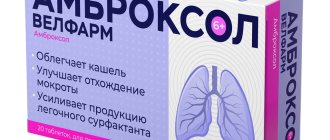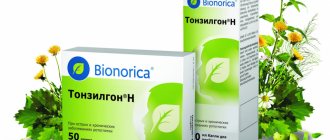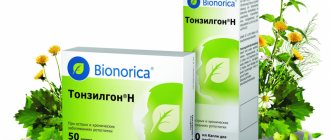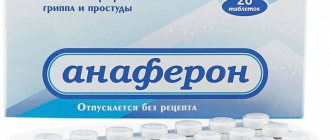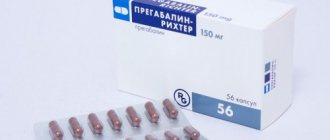Composition of the drug
The cough medicine Bronchipret consists of a complex of herbal components. Plants for their production are grown in ecologically clean areas on plantations. During the production of the product, multi-stage quality control is provided. This guarantees the safety of the product.
The main ingredient of the medicine in any form is common thyme extract. This plant has long been used in folk medicine to treat diseases of the upper respiratory tract. The extract used in the preparation facilitates expectoration and accelerates the removal of mucus, as it has the following effects:
- Reduces the inflammatory process.
- Reduces the viscosity of the secretion.
- Destroys pathogenic microorganisms.
- Has a bronchodilator effect.
Other components in its composition enhance the effect of the drug:
- Ivy leaves. They have secretolytic, antimicrobial and bronchospasmolytic effects.
- Primrose roots. The extract from them has a strong anti-inflammatory effect, and also accelerates the removal of sputum and has a bronchospasmolytic effect.
In addition to the main component, bronchipret tablets contain primrose root extract, and bronchipret syrup contains ivy leaf extract. The combination of herbal components allows for maximum effectiveness of the drug due to the synergistic effect. The effectiveness of cough treatment and good tolerability of the drug by patients of any age have been confirmed through large multicenter studies.
The drug Bronchipret contains no preservatives, artificial colors or flavors. They are often potential triggers of delayed-type hypersensitivity reactions. This means that when treated with the drug, the likelihood of allergic manifestations is significantly reduced.
Indications and use
Bronchipret, the instructions confirm this, is prescribed for the treatment of cough in various inflammatory diseases of the respiratory tract. The drug is indicated in the complex treatment of bronchitis, tracheobronchitis, tracheitis, which is accompanied by cough with the formation of sputum.
Bronchipret tablets and syrup are intended for oral administration before meals. The course of treatment with the drug is 12-14 days. Extending it or repeating it after a certain time is possible only on the recommendation of a doctor.
The drug can be taken in tablet form from 12 years of age. Dosage for complex therapy of diseases - 1 tablet three times a day. The syrup is approved for the treatment of children from 3 months and adults. When taking it, you must follow the dosage recommendations specified in the instructions for use. The solution in the bottle should be shaken before use.
BRONCHIPRET (syrup)
reparations were divided into several types.
- antitussive medications that suppress cough. For dry, unproductive cough. For example - “Bronholitin”, “Sinekod”. You need to be extremely careful with this group. You can cause great harm to the body by taking a cough suppressant medicine while you have a wet cough with sputum production;
— mucolytics dilute sputum without increasing its volume. In a less viscous state, sputum is easier to remove. A non-productive dry cough becomes productive. An example of a mucolytic is the drugs “Ambrobene”, “Bromhexine”;
— expectorants irritate the gastric mucosa and irritate the cough center in the brain. That is, antitussives depress, and expectorants, on the contrary, stimulate and irritate the cough center, which is located in the medulla oblongata in close proximity to the vomiting center. Which is probably the reason for “coughing to the point of vomiting in children” with severe irritation of these centers caused by an increased dosage or increased time of taking expectorant drugs. An example of an expectorant is “Licorice root syrup”;
- bronchodilators, from the name of which it is clear that they relieve bronchial spasms and are used much less frequently than other “antitussive” drugs. Used for bronchial asthma, bronchial edema, chronic obstructive pulmonary disease, as well as for very prolonged cough treatment. When you see in a movie a hero in an extreme situation, choking and frantically looking for an inhaler, the medicine in aerosol form is the bronchodilator necessary to relieve an attack of a patient with bronchial asthma.
Each medicine from these groups is taken at different periods of the disease. And the first group in the above list cannot be combined with the second. Doctors also do not recommend combining mucolytics and expectorants.
The abundance and availability of medications, as well as the chaos in their recommendations by doctors and representatives of the pharmaceutical industry, really scares me. Whenever possible, I try to use herbal-based products, such as “Mukaltin”, “Pectusin”, infusions and decoctions using marshmallow root, licorice, and thyme. Today, many drugs have appeared that position themselves as combinatorial drugs with multidirectional effects. Without being a doctor or chemist, you can make a mistake and get lost in the dense forest of pharmaceuticals.
About 3 years ago I turned my attention to the drug “Bronchipret” from the German company, one of the world’s largest manufacturers of herbal medicines.
The drug is available in two dosage forms - tablets and syrup. The composition of the two forms differs significantly. I chose the syrup form because, according to the instructions, the drug in this form can be used by children aged 3 months and older, while “Bronchipret” in tablet form can only be used from 12 years of age.
Bronchipret syrup is used as an expectorant. Accordingly, it cannot be used together with antitussive drugs. The drug also reduces the viscosity of sputum and accelerates its evacuation.
Liquid extracts of thyme and ivy are stated as active substances.
The biologically active components that make up thyme have anti-inflammatory, analgesic, and hypnotic properties and have an antiseptic effect. By the way, the domestic drug “Pertussin” syrup also contains liquid extract of creeping thyme. There is a little less of it here than in the hero of my review. But “Pertussin” costs about 70 rubles for the same 100 ml. Bronchipret syrup is available in 100 and 50 ml volumes. The cost of a 100 ml bottle is about 370 rubles. 50 ml is very unprofitable to buy (approximately 220 rubles).
The antispasmodic properties of ivy help relax muscles and reduce coughing attacks. Saponins are the main active ingredients of ivy; they thin mucus, making it easier for it to leave the respiratory tract. Ivy leaf extract is a good anti-inflammatory and decongestant. By the way, “Gedelix” syrup contains 0.8 g of ivy leaf extract, while “Bronchipret” contains almost twice as much - 1.5 g. In my opinion, at almost the same price, “Bronchipret” syrup "" significantly outperforms "Gedelix" in terms of the composition of "natural components."
It is worth paying attention to the presence of 7% ethanol, ethyl alcohol in the composition of the drug. But this doesn’t really scare me, since it is this substance that extracts all the beneficial substances from plants. Almost all medicinal tinctures and extracts are prepared using this alcohol.
Instead of sugar, maltitol syrup, a chemical substance (E 965), is used as an excipient in Bronchipret syrup. Unfortunately, the instructions do not indicate the dosage of this sweetener. This is probably important for diabetics.
The dosage of potassium sorbate (E 202), which apparently acts as a preservative in the syrup, is also not indicated. Today, potassium sorbate is considered one of the safest preservatives, but I would still like to see the dosage.
The detailed instructions included with the drug indicate different methods of use and dosages: in accordance with age and body weight. In order not to measure drops each time, the manufacturer suggests using a measuring cup, which has 5 divisions and which is convenient to put on a bottle of syrup.
We used Bronchipret syrup several times and it proved to be a fairly effective and safe medicine. True, we (Thank God) did not have to use this drug for severe forms of cough.
Contraindications and side effects
A contraindication to the use of the drug is hypersensitivity to any components of the drug. Therefore, it is important to carefully study its composition before using the medicine. It is prohibited to use bronchipret during pregnancy and lactation. Medicine in the form of syrup is not prescribed to children under 3 months, and tablets cannot be used to treat children under 12 years of age.
The product contains ethanol, so it is not recommended for use in alcoholism. It is advisable to avoid treating cough with bronchiprete if epilepsy is diagnosed. It should be used with caution in the presence of liver pathologies, brain diseases and traumatic brain injuries. You should consult a doctor about the possibility of treating cough with bronchipret if you have various gastrointestinal diseases, in particular gastritis and peptic ulcers.
Side effects include allergic reactions. They most often present with skin rash and shortness of breath. In severe cases, as the instructions note, urticaria, swelling of the face and mouth occur.
Symptoms of overdose are manifested by side effects from the gastrointestinal tract in the form of nausea, diarrhea and abdominal pain. If the dose recommended by the instructions is exceeded, symptomatic treatment should be carried out.
Bronchipret
Bronchipret is an expectorant herbal medicine from a German pharmaceutical company. It is used as part of complex symptomatic treatment of acute respiratory infections with accompanying cough and excessive mucus formation (inflammation of the mucous membrane of the trachea, bronchi, etc.). The extracts of ivy and thyme included in the drug have a mucolytic (thin the mucus and facilitate its evacuation from the respiratory tract), antispasmodic (relieves spasms of the smooth muscles of the bronchi), anti-inflammatory effect and potentiate the effects of each other. Research in the field of pharmacognosy suggests that these two plant components are an ideal combination for inclusion in drugs for the treatment of pathologies of the respiratory tract. Bronchipret is a modern combined herbal preparation, endowed with a mild, gentle effect and not inferior to artificially synthesized mucolytics. In addition to the above effects, the drug also has antiviral, antimicrobial, secretomotor (stimulates the discharge of sputum during a wet cough) effect. The uniqueness of Bronchipret lies in its inhalation effect, which manifests itself after oral administration. The drug can be used in patients of all age groups, incl. in children when they reach three months. Bronchipret is not contraindicated for people with diabetes, which cannot be said about every antitussive drug.
The medicine is convenient to use, because Each patient can choose a convenient dosage form for themselves: syrup, drops, tablets. Due to the presence of ethanol in the composition, Bronchipret is not recommended for people who abuse alcohol, suffer from epilepsy and liver diseases, have a history of traumatic brain injury, as well as during pregnancy and lactation. The optimal time to take Bronchipret is after meals. The duration of the medication course is 10-14 days. Extension of treatment and/or the possibility of a repeat course is discussed with the attending physician. As a rule, the drug is well tolerated and does not cause side effects. In rare cases, allergic reactions develop. Symptoms of overdose: dyspeptic disorders (epigastric pain, diarrhea, nausea). Bronchipret is not recommended for use in combination with central antitussive drugs and drugs that reduce mucus formation, because this will make it difficult to evacuate the liquefied bronchial secretions from the airways. If after 10-14 days of medication there is no improvement, it is recommended to seek medical advice. Cloudiness of Bronchipret syrup during long-term storage is not a sign of poor quality of the drug and a decrease in its effectiveness. It is recommended to shake the syrup vigorously before use.
Features of use
You cannot continue to use the drug bronchipret if there is no positive dynamics during the course of treatment for a week. You cannot combine the medicine with other antitussives, the action of which is aimed at reducing the amount of sputum. This will make it difficult to cough and reduce the effectiveness of the drug. The effectiveness of treatment increases when bronchipret is combined with antibacterial drugs.
Since the drug contains ethanol, during treatment it is necessary to use caution when driving vehicles or performing operations that require increased precision and attention. To a certain extent, after taking bronchipret, psychomotor reactions slow down.
Bronchipret tablets and syrup are prescription drugs and have an affordable price. The medicine must be stored at a temperature not exceeding 25 ° C in a place protected from light and moisture, to which children do not have access. Shelf life – 3 years. The syrup may become cloudy during storage, but this factor does not impair its medicinal properties. After the expiration date, the product must not be used.
